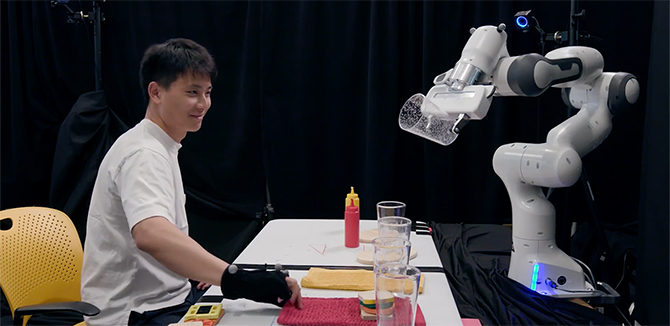Dealing With Distractions
Felix Wang’s work at MIT teaching robots to stay on course was made possible by his time in the MSR program. As he continues to pursue his PhD, Wang remains grateful for the knowledge MSR gave him.

Think of how many steps it takes to eat a bite of milk-laden cereal for breakfast.
The average person doesn’t need to do much thinking to complete that task. Yet for a robot to take your Cheerios on a similar journey in a real-life environment like your family kitchen, the task isn’t nearly as easy.
Felix Wang (MSR ‘18) is working to change that.
Wang is a PhD student in the MIT Computer Science and Artificial Intelligence Laboratory (CSAIL), a far different place than he thought he would be when he graduated with a bachelor of arts in physics from Middlebury College.
His career path changed thanks to Northwestern Engineering's Master of Science in Robotics (MSR) program.
"I wanted to explore whether I had any talent for robotics, which is what got me started with MSR," he said. "MSR changed my life."
Now he's looking to use robotics to change humans' lives. At MIT, Wang is helping teach robots to deal with distractions and course deviations they might encounter in locations where they could one day work around humans.
“The idea I'm trying to research is on algorithms that can help turn robots into a household maid that can help you cook your dinner or clean your dishes,” Wang said. “It’s about those kinds of collaborative tasks with humans in a household environment.”
Which goes back to the breakfast table.
Humans might think of scooping cereal into their mouths as one continuous task, but it really is a series of related and interconnected subtasks.
Gripping a spoon.
Inserting it into the bowl.
Scooping up a proper amount of cereal.
Moving the spoon to your mouth.
Tilting the spoon to deposit the food.
Removing the spoon from the mouth.
For a robot, an interruption or unexpected obstacle at any point in that journey would typically require humans to restart the process, otherwise the robot would fail the task. Wang is using machine learning to teach robots to deal with interruptions so they can quickly get back to the job at hand without starting over.
This would have applications well beyond the home.
Currently, robots integrated into warehouses frequently operate in areas cordoned off with a fixed pre-programmed task. If Wang and his MIT colleagues are successful, robots would be able to more fully and flexibly integrate into a manufacturing setting and be human helpers instead of a separate workforce.
Work by Wang and collaborators was featured on PBS NewsHour and he is scheduled to present details about his work at the 2024 International Conference on Learning Representations.
None of what he's doing, he said, would be possible without MSR.
“Robotics is a gigantic field, and if you are a starter or beginner, you can very easily get lost,” he said. “What MSR gives you is a structure and a support system that helps you scope down the problems so that every piece is manageable. MSR is a flexible opportunity that gives you the space and time to explore what you want to do with robotics and explore the potential outcomes you could pursue so it doesn't limit your potential.”
Photo taken from Interactive Robotics Group's robot demos video for Envisioning Robot Teammates exhibit at the MIT museum

